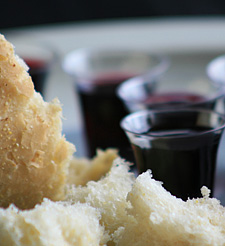The debate over who has the right to officiate at the Lord’s Supper is engaging Christians across the planet, particularly in the light of recent synod decisions by the Sydney Diocese of the Anglican Church. The following is intended as a helpful online resource for those seeking to understand the Sydney Anglican position.
An overview of the Lord’s Supper debate
 Sydney Diocese has been at the forefront of rethinking lay and diaconal involvement in the Sacraments.
Sydney Diocese has been at the forefront of rethinking lay and diaconal involvement in the Sacraments.
The following writings and reports help set out the arguments forwarded by Sydney Diocese in favour of lay and diaconal administration of the Lord's Supper (what some Anglicans call "presidency of the Eucharist').
Archbishop Peter Jensen
Theological reflections on lay administration
"It is commonly suggested that the development of lay administration of the Holy Communion is contrary to the very being of Anglicanism" the assertion that it is contrary to the ethos of the Anglican Church really speaks for one side of the Church only."
The pastoral need for lay administration of Holy Communion
"It is sometimes suggested that while lay administration may well be needed in rural areas it is hardly an issue in an urban setting" I would respond that this is an outdated view of the realities of urban mission."
John Woodhouse, Mark Thompson, et. al.
The Lord's Supper in Human Hands
The Australian Church Record and the Anglican Church League have released "The Lord's Supper in Human Hands' in an attempt to summarise the course of Sydney's journey towards lay and diaconal administration of the Lord's Supper.
The book has contributions from the Rev Dr John Woodhouse, and the Rev Dr Mark Thompson from Moore Theological College. It also includes articles by Bishop Glenn Davies, and Robert Tong.
It assembles the theological arguments for, and answers some objections against. It outlines the timeline of the over 30-year long debate, providing a record of all of the major discussions and decisions, and it sets Sydney's debate in the context of global discussion and Anglican history.
It can only be purchased directly from the Australian Church Record via snail mail.
Robert Doyle
"Lay Administration' and the Sixteenth Century
"Some of the discussion on the propriety of lay administration of Holy Communion does not appear to have been sensitive to the radical change that occurred in "what the 16th century Reformers did and believed', nor to their methodology: that is, not sensitive to how they understood God works in the world."
Key Sydney Diocesan Doctrine Commission Reports
1983
In this report the Doctrine Commission believing "that there is no Scriptural or doctrinal barrier to lay presidency at the Eucharist recommends that "Synod explore immediately the desirability and constitutional aspects of such a presidency'.
1993
The Doctrine Commission accepts the finding of the 1983 report that “there is no Scriptural or doctrinal barrier to lay presidency”. Moreover, it says, there do exist positive reasons, theological, historical and practical, for allowing lay presidency at the Lord’s Supper.
Key Sydney Standing Committee Reports
1987
Following the reception of the 1985 report, the Synod endorsed the principle of lay presidency and requested the Standing Committee to investigate ways the possible legal and other difficulties in enacting this principle could be overcome. The various reports show that there is a difference of opinion on this matter.
1987
A report into the “nature of a distinctive and permanent diaconate”.
1988
At the 1987 session, the Synod requested that area deanery conferences be held to hear feedback on moving towards a distinctive and permanent diaconate. The summary of responses from area deanery conferences ran to 13 foolscap pages but are summarised here.
1994
In March 1994 Synod passed a resolution endorsing the principle of lay presidency and requested that Standing Committee bring to the next session of Synod legislation to enable deacons and lay persons to preside at the Lord’s Supper.
1999
In 1998 Synod requested that the Standing Committee bring to the 1999 session legislation as would enable a five year experimentation of lay and diaconal administration of the Lord’s Supper. This bill was passed by Synod but not signed into law by then Archbishop of Sydney, Harry Goodhew.
2004
In 2003, the Synod requested that the Standing Committee - bring to the next session a bill which incorporates the recommendations of its sub-committee for consideration by the Synod at that session, and arrange a formal debate on the bill at that session, and report to that session as to the possible consequences of the passing of an ordinance which authorises diaconal and lay administration and as to how any adverse consequences can be avoided.
Further reading…
2007
In response to the withdrawal of a motion containing a Declaration on the Administration of the Lord's Supper at the 2004 synod (see Appendix A) the Standing Committee of the Diocese of Sydney appointed a committee to look at the legal barriers.

























